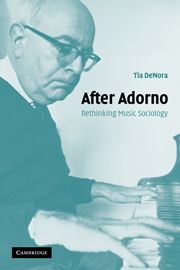Book contents
- Frontmatter
- Contents
- List of figures
- List of music examples
- Preface: a two part invention
- Acknowledgements
- A note on background reading
- 1 Adorno, ‘defended against his devotees’?
- 2 New methods and classic concerns
- 3 Music as cognition
- 4 How does music ‘channel’ emotion?
- 5 Music and ‘control’
- 6 After Adorno: rethinking music sociology
- Bibliography
- Index
6 - After Adorno: rethinking music sociology
Published online by Cambridge University Press: 22 September 2009
- Frontmatter
- Contents
- List of figures
- List of music examples
- Preface: a two part invention
- Acknowledgements
- A note on background reading
- 1 Adorno, ‘defended against his devotees’?
- 2 New methods and classic concerns
- 3 Music as cognition
- 4 How does music ‘channel’ emotion?
- 5 Music and ‘control’
- 6 After Adorno: rethinking music sociology
- Bibliography
- Index
Summary
To speak of the sociology of music to is to perpetuate a notion of music and society as separate entities. It is also to imply that the task of socio-musical studies consists of various attempts to see the social in music – as influence on musical shape and style, and as ideology to be revealed in music's content. In all of this effort there is too much stasis, too much thinking ‘about’ music and what it says, what it does, what makes it take the forms that it assumes. There is, one might suggest, too much of an academic attitude to music here and too little interrogative focus on music as a medium of living and being.
With respect to the latter, Adorno's work is unparalleled as a serious alternative to the otherwise rather scholastic focus on music's social meanings and social shapings: it exceeds both semiotic and the now-traditional sociological focus on music's social production. Adorno focused on music's role in relation to consciousness, to the psycho-cultural foundations of social life. In that focus, he implicitly rejected the dualism of music and society.
Music as society – a summary of Adorno's view
To speak, in this way, of music as causative is to excise the ‘and’ from the phrase ‘music and society’. It is instead to view music as a manifestation of the social, and the social, likewise, a manifestation of music.
- Type
- Chapter
- Information
- After AdornoRethinking Music Sociology, pp. 151 - 158Publisher: Cambridge University PressPrint publication year: 2003
- 1
- Cited by



